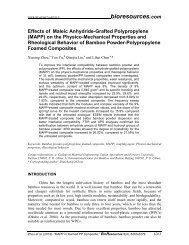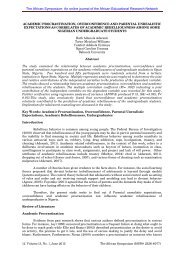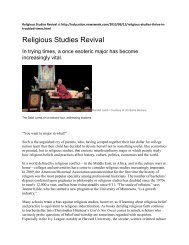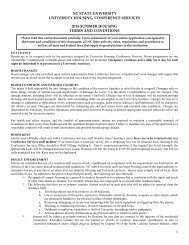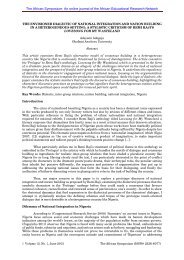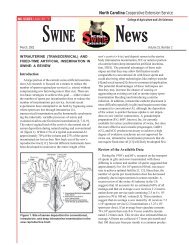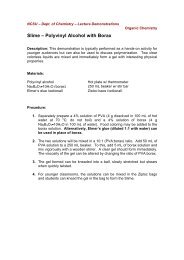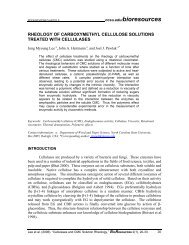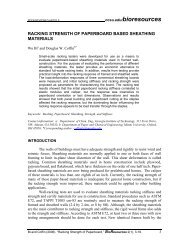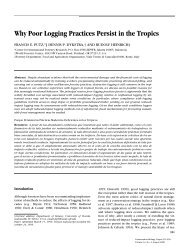Dictators, Songwriters, and the Negotiation of Censorship
Dictators, Songwriters, and the Negotiation of Censorship
Dictators, Songwriters, and the Negotiation of Censorship
You also want an ePaper? Increase the reach of your titles
YUMPU automatically turns print PDFs into web optimized ePapers that Google loves.
Starmakers: <strong>Dictators</strong>, <strong>Songwriters</strong>...<br />
revised, <strong>and</strong> stated less directly. The alterations have <strong>the</strong> effect <strong>of</strong> subtly<br />
shifting <strong>the</strong> critique away from <strong>the</strong> government <strong>and</strong> towards society in<br />
general, apparently criticizing consumer society. “Oye hijo las cosas están<br />
de este modo / la radio en mi cuarto me lo dice todo. / ¡No preguntes más!<br />
/ Tenés sábados, hembras y televisores / ¡No preguntes más!” (ll. 16-21).<br />
The revised verse seems to have shifted <strong>the</strong> critique away from a<br />
personified entity that consciously attempts to wrest political power from<br />
<strong>the</strong> people; instead, <strong>the</strong> superficiality <strong>and</strong> undue influence <strong>of</strong> commercial<br />
popular culture seem to be <strong>the</strong> target <strong>of</strong> criticism (radio, sábados, hembras,<br />
televisores / No preguntes más). This <strong>and</strong> o<strong>the</strong>r changes seem to have<br />
extracted all reference to <strong>the</strong> political system, <strong>and</strong> replaced <strong>the</strong>m with social<br />
or personal issues. Ano<strong>the</strong>r substitution effects <strong>the</strong> following<br />
transformation: “[p]ero es que ya me harté de esta ‘libertad’ / y no quiero<br />
más paredes que acaricien mi espalda” (ll. 28-9) becomes instead<br />
“[s]iempre el mismo terror a la soledad / me hizo esperar en vano que me<br />
dieras tu mano” (ll. 22-25). The focus has been shifted from a criticism<br />
about <strong>the</strong> lack <strong>of</strong> civil liberties to concerns about loneliness <strong>and</strong><br />
relationships. At <strong>the</strong> same time that <strong>the</strong> issues have been redirected away<br />
from <strong>the</strong> political, <strong>the</strong> lyrics are not completely neutralized or depoliticized.<br />
The tone <strong>of</strong> <strong>the</strong> song is still one <strong>of</strong> desperation. The suggestion remains that<br />
we are being controlled, because in that environment, in which repression<br />
was a constant topic, such a reference to market manipulation<br />
metonymically calls to mind <strong>the</strong> manipulation <strong>of</strong> <strong>the</strong> state as well. The<br />
metaphor is ambiguous enough to allow multiple possible readings, with<br />
one still being a denouncement <strong>of</strong> <strong>of</strong>ficial state control.<br />
Ano<strong>the</strong>r example <strong>of</strong> a shift away from <strong>the</strong> government itself as<br />
target is “Música de fondo para cualquier fiestita animada”, which was<br />
converted from a satire <strong>of</strong> government oppression into a satire <strong>of</strong> high<br />
society <strong>and</strong> <strong>the</strong> oligarchy. Whereas <strong>the</strong> original version had <strong>the</strong> president<br />
concerned about “la manera de pacificar a las bocas que pedían libertad” (ll.<br />
33-4), <strong>the</strong> revision has an upper class gentleman suffering from “el<br />
deshonor de sus sirvientas infieles” <strong>and</strong> his “mujer neurótica” (ll. 3-5).<br />
65



